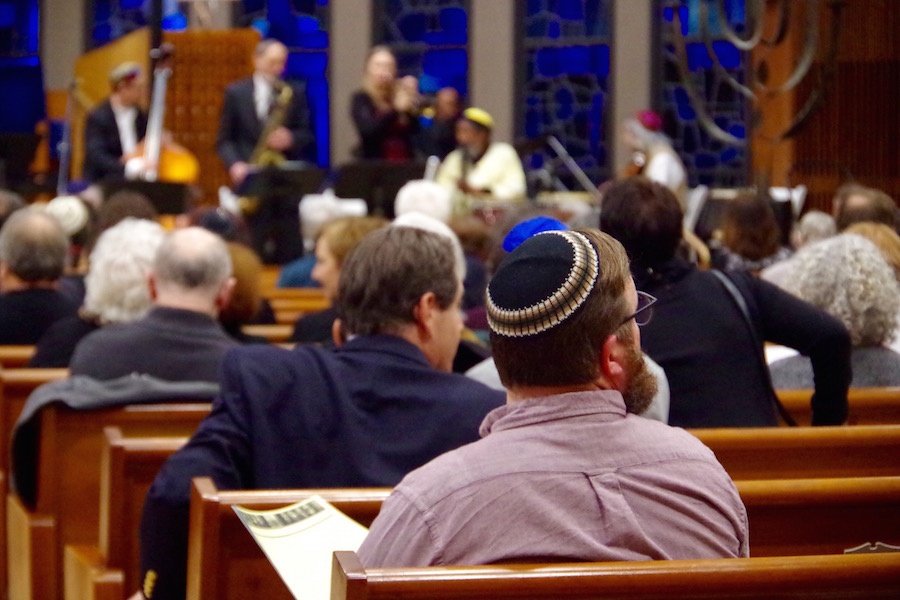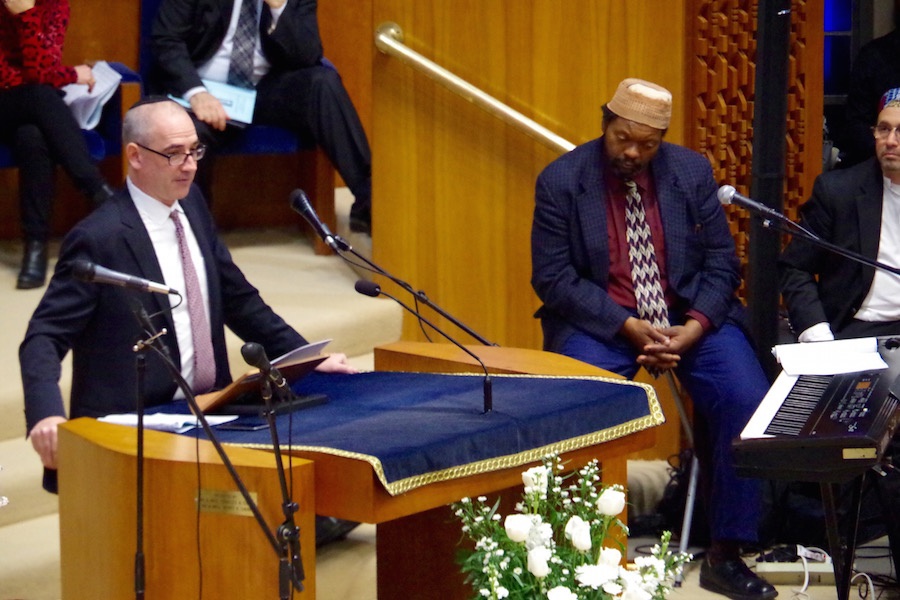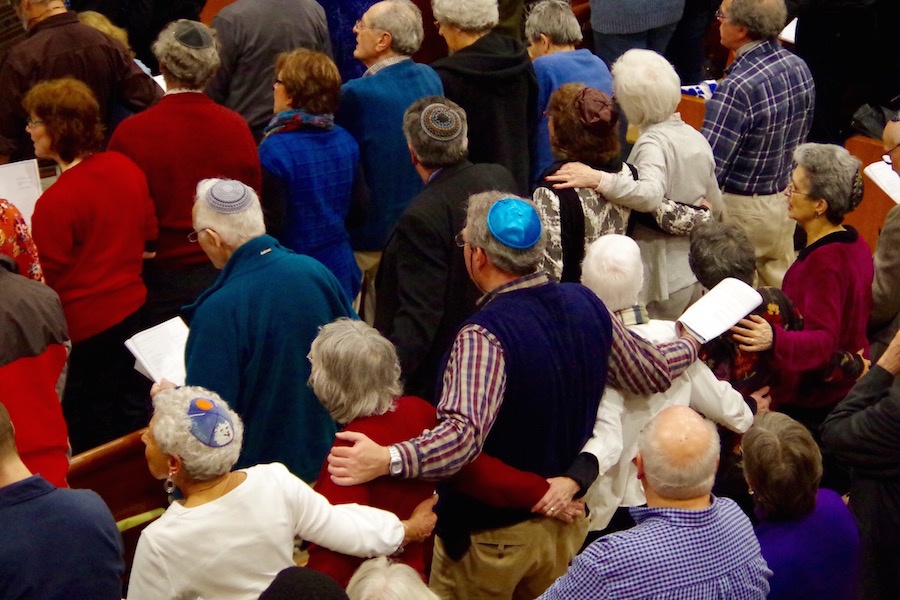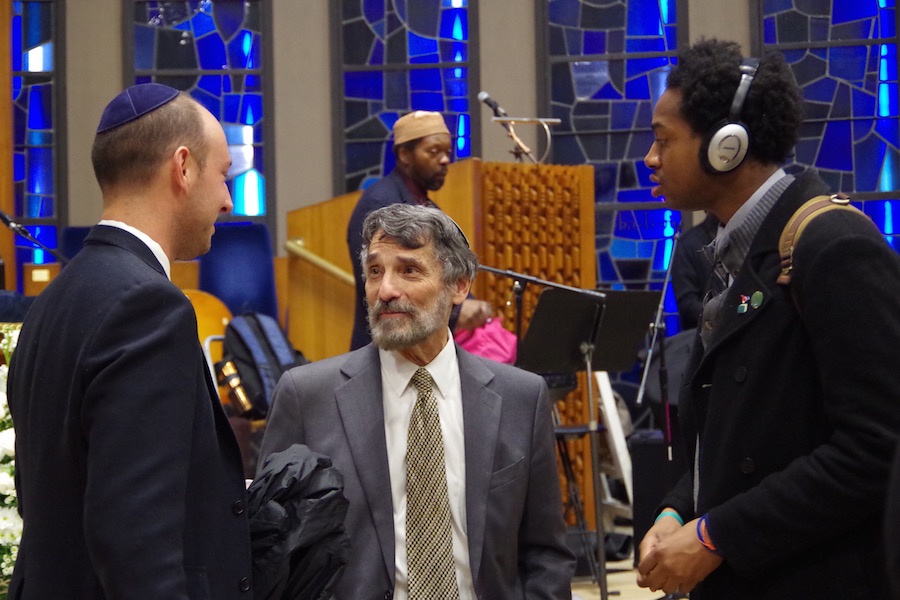The airports were packed. Outside, chants of “No ban, no wall” and “Impeach!” ricocheted against tall, austere walls and automatic doors. Inside, legal teams were scrambling. In the balance hung 2,000 lives, newly arrived to the U.S., that would perish if put on planes back home.
Professor Michael Wishnie recalled that moment Friday evening, as he took center stage at Congregation Mishkan Israel (CMI) for its seventh annual interfaith tribute to Martin Luther King, Jr. A decades-long tradition, the tribute service brought in not only Wishnie, a law professor at Yale University, but also faith leaders from New Haven, North Haven, West Haven, Hamden, and Hartford. The Afro-Semitic Experience provided music for the night’s event, playing from its outset to its end.
Held on the 50th anniversary year of King’s assassination and 57 after he spoke at CMI in 1961, the three-hour service focused on building not only the “beloved community,” but also a viable resistance, under the presidency of Donald J. Trump. Attendees heard readings from not just Jewish but also Muslim, Bahai, Zen Buddhist, and multiple Christian traditions, prayers for peace coasting over the crowd in multiple languages and tones.

As the 7:30 p.m. service drew near, the pews filled with attendees from Jewish, Muslim, Bahai, Buddhist, and Christian Backgrounds. Lucy Gellman Photo.
“While we may not be Moses, or Nahshon [splitter of the Red Sea], or Thoreau, or King, we also need not lead lives of quiet desperation,” said CMI Rabbi Herbert Brockman. “Such are the seeds of despair, you see, in what modern psychologists today are calling the collapse of compassion.”
The night’s featured speaker, Wishnie has made a life fighting that collapse in compassion. He leads the Worker and Immigrant Rights Advocacy Clinic at Yale and has spent years representing underserved groups including workers, immigrants, and refugees among others.
Addressing a full synagogue, he recalled a cold January night almost exactly a year ago, as his cell phone rang on the way out of a Boston Celtics game. Just hours before, the president had ordered his first refugee ban, targeting Iran, Iraq, Libya, Somalia, Sudan, Syria and Yemen. On the other end of the phone were Rebecca Heller, a former student of Wishnie's who has gone on to run the International Refugee Assistance Project (IRAP), and civil rights lawyer Justin Cox, a “farm kid” who had graduated from Yale Law School and gone back to the South.

Wishnie addresses the congregation. Lucy Gellman Photo.
Heller explained what was going on: One of the refugees she was working with, Hameed Khalid Darweesh, had taken off from his native Iraq the day before. Donald Trump’s order, effectively banning his entry, had dropped while his plane was in the air. By the time he arrived at JFK airport in New York, security detained him with no protocol in place.
What Heller and Cox told Wishnie—that they were thinking about filing a lawsuit seeking a writ of habeas corpus—was the beginning of a sleepless night, filled with students from the Worker and Immigrant Rights Advocacy Clinic working together to file a lawsuit in Federal Court by 6 a.m. the next day. (Read the full story on the New Haven Independent.)
They were working across New Haven, New York, and Cambridge, Mass. They were first-year law students still wet behind the ears, and third-years on the job hunt, and graduates of Yale Law School who had gone on to work for refugee rights. They were students ready to forego sleep and showers for legalese and drafts of dense documents.
They were fearless, Wishnie said, because “they don’t know any better.” And they did it by working in lockstep with each other, taking on different responsibilities to get the suit filed in time.
And they prevailed. At least temporarily.

As 2,000 refugees were released from airports around the country, the case’s afterlife was just beginning. The following Monday, the case was referred to a judge who “didn’t buy our arguments.” Wishnie broke the news to his students: It didn’t make sense to press the case forward. The students had made available the legal tools for other lawyers to press similar cases around the country. They needed to step back.
That was almost a year ago. Now, one January and three proposed bans later, Wishnie said that “I don’t know what will happen.”
“This is not a triumphal story. We did not conquer and defeat the travel ban,” he said. “We all have something to offer. Words will not save us. The courts will not save us. Congress will not save us. The media will not save us. All of our institutions can help, but so can all of you … because there’s no magic bullet. We all have to act. We all have to do a little more than we did before.”
In the synagogue, that banding together had started hours before, as the Afro-Semitic Experience welcomed attendees with a jovial “Eliyahu Hanavi” and “The Road that Heals The Splintered Soul.” As they played, musicians rocked around their instruments, trumpet Saskia Laroo stomping her feet in place. Soaked in their melodies,Brockman ushered in shabbat with not only a normal welcome, but a reading from the Koran and prayers for peace, delivered by Imam Abdul-Majid Karim Hasan and Reverends Scott Morrow and Paul Fleck.
Close to 30 spiritual leaders gathered at the front of the congregation, seated with each other for the ceremony. As the service unfolded, many alluded to commonalities across their traditions— an abounding hope for peace, and call for compassion, that exists across scriptures, holy writing, and religious greetings.
They were there, like Wishnie’s students, to drive out the darkness with their expressions of faith. Before Brockman delivered the Mourner’s Kaddish, Abbot Paul Bloom of the New Haven Zen Center drew parallels to it as he chanted a memorial meditation, bending in reverence as he chanted.
During a Mi Shebeirach, they nodded as Brockman added immigrant rights activist Ravi Ragbir to a list of sick or needy community members in need of healing. Brockman said that during a recent check-in with Immigrations and Customs Enforcement (ICE) officials, Ragbir was arrested and taken to an unknown location. Now, nobody knows where he is.
“We will not become a country of the disappeared,” he said, a wave of mmmms and hmmmmms radiating through the audience

Rabbi Herbert Brockman with Wooster Square Alder Aaron Greenberg and Hamden City Council member Justin Farmer.
Their resolve seemed to strengthen them in the pews. At the beginning of a mashup of “Oseh Shalom” and “We Shall Overcome,” attendees bobbed their heads, a few extending hands to their neighbors. By the end of it, they were linking arms and swaying in the pews, some almost in the aisles.
Back at the front, Wishnie also offered a solution—with the words of secular leader Fred Rodgers.
“If you see an image of a burning building, a house on fire, always look to the edges,” he said. “Because at the edges, there are always people trying to help.”
He looked out into the audience, faces from different churches, synagogues, and political organizing campaigns staring back.
“If we hold on to that, and be those people at the edges of the picture, I think we’ll get through.”
class="sqs-audio-embed"
data-url="http://static1.squarespace.com/static/597a410a46c3c43941319f89/597a449f440243827c4a599a/5a5cc5418165f5ec9df913ab/1516029318273/Wishnie.mp3/original/Wishnie.mp3"
data-mime-type=""
data-title="Michael Wishnie | Full Remarks"
data-author="Arts Council of Greater New Haven"
data-show-download="true"
data-design-style="minimal"
data-duration-in-ms="1943000"
data-color-theme="dark"
>
To listen to Wishnie's full speech, click on or download the audio above.